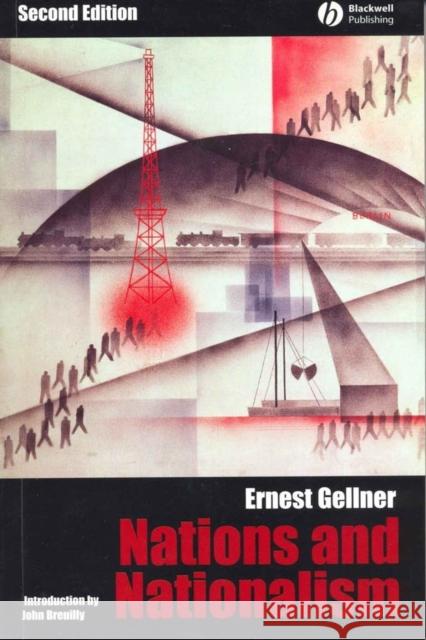Nations and Nationalism » książka



Nations and Nationalism
ISBN-13: 9781405134422 / Angielski / Miękka / 2006 / 208 str.
Nations and Nationalism
ISBN-13: 9781405134422 / Angielski / Miękka / 2006 / 208 str.
(netto: 135,84 VAT: 5%)
Najniższa cena z 30 dni: 142,34
ok. 30 dni roboczych.
Darmowa dostawa!
This updated edition of Ernest Gellner's classic exploration of the roots of nationalism includes an extended introduction from John Breuilly, tracing the way the field has changed over the past two decades. * As pertinent today as it was when it was first published in 1983.
"Over ten years after his death, Gellner′s impact remains unparalleled. We are captivated by the explanatory power of Gellner′s crystalline prose enriched by flowing sequences of causations. The reader is typically enchanted by Gellner′s logical rigour as if mesmerised by the contemplation of an art masterpiece. We should wonder whether we are dealing with a scholar or with a poet. The answer is probably both."
Nations and Nationalism <!––end––>
"Breuilly s new introduction provides an excellent critical overview of Gellner s writings on nationalism, judiciously evaluating his ideas while also providing insights into their place and continuing significance within the wider historiography of nationalism studies." Paul Lawrence, The Open University
"Nations and Nationalism has become such an intrinsic part of the standard literature that it is regularly cited by both those who share its views and those who distinguish their approach from Gellner s."
Totalitarian Movements and Political Religions
"The second edition of this canonical text comes with a compelling Introduction by John Breuilly which revisits Gellner′s theory in the light of contemporary debates on nationalism. Umut Özkýrýmlý, Istanbul Bilgi University
reviews of the first edition:
"Brilliant, provocative ... a great book." New Statesman
"An important book ... a new starting line from which all subsequent discussions of nationalism will have to begin." New Society
"A better explanation than anyone has yet offered of why nationalism is such a prominent principle of political legitimacy today ... a terse and forceful work ... the product of great intellectual energy and an impressive range of knowledge." Times Literary Supplement
"Gellner′s short book is an incisive, penetrating and persuasive discussion of how the nation–states of the modern industrial world differ from earlier states ... Gellner uses this analysis to explain the force of nationalism in the modern world." International Security
"Gellner′s range is wide, covering the ideas of some modern thinkers from Marx, Malinowski and Carr to heideggar, Hroch, Havel and Said." Race and Class
Series Editor s Preface.
Introduction by John Breuilly.
Acknowledgements.
1. Definitions.
State and nation.
The nation.
2. Culture in Agrarian Society.
Power and culture in the agro–literature society.
The varieties of agrarian rulers.
3. Industrial Society.
The society of perpetual growth.
Social genetics.
The age of universal high culture.
4. The Transition to an Age of Nationalism.
A note on the weakness of nationalism.
Wild and garden culture.
5. What is a Nation.
The course of true nationalism never did run smooth.
6. Social Entropy and Equality in Industrial Society.
Obstacles to entropy.
Fissures and barriers.
A diversity of focus.
7. A Typology of Nationalisms.
The varieties of nationalist experience.
Diaspora nationalism.
8. The Future of Nationalism.
Industrial culture one or many?.
9. Nationalism and Ideology.
Who is for Nuremberg?.
One nation, one state.
10. Conclusion.
What is not being said.
Summary.
Select bibliography.
Bilbliography of Ernest Gellner s writing: Ian Jarvie.
Index
Ernest Gellner was born in Paris in 1925 and brought up in Prague, fleeing with his family to England in 1939. He taught at the LSE from 1949, where he was Professor of Philosophy with special reference to Sociology from 1962 until 1984, when he became William Wyse Professor of Social Anthropology at the University of Cambridge. At the end of his life, in 1995, he was Director of the Centre for the Study of Nationalism, part of the Central European University, in Prague. He wrote many books, among them
Words and Things (1959),
Thought and Change (1964),
Saints of the Atlas (1969),
Legitimation of Belief (1974),
The Psychoanalytic Movement (1985),
Plough, Sword and Book: The Structure of Human History (1988),
Conditions of Liberty: Civil Society and its Rivals (1994), and the posthumous
Language and Solitude: Wittgenstein, Malinowski and the Habsburg Dilemma (1998).
John Breuilly is Professor of Nationalism and Ethnicity at the London School of Economics. He taught at Manchester University from 1972 until 1995 and at Birmingham University from 1995 until 2004. He has held visiting Professorships at the universities of Hamburg (1987–8) and Bielefeld (1992–3) and a Research Fellowship at the Wissenschaftskolleg Berlin (2001–2). Book publications include Austria, Prussia and Germany 1806–1871 (2002), Nationalismus und moderner Staat. Deutschland und Europa (1999), The Formation of the First German Nation–State, 1800–1871 (1996), and Nationalism and the State (2nd.ed., 1993)
Ernest Gellner s
Nations and Nationalism (1983) provides one of the most powerful and original interpretations of modern nationalism. Drawing upon a range of disciplines, including philosophy, anthropology, sociology, politics and history, Gellner argues that nationalism is an inescapable consequence of modernity.
For this new edition of Nations and Nationalism, John Breuilly, Professor of Nationalism and Ethnicity at the London School of Economics and Political Science, provides a substantial introduction, analysing Gellner s arguments and tracing and evaluating the ways in which the field has changed over the past two decades. Suggestions for further reading have also been updated.
Second Edition not available from Wiley–Blackwell in North America.
1997-2026 DolnySlask.com Agencja Internetowa
KrainaKsiazek.PL - Księgarnia Internetowa









